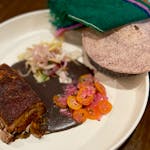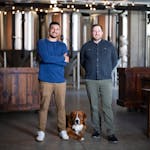A smartphone is mandatory for a visit to a Twin Cities bar specializing in cocktails, first to snap (and then post) an image of a bewitching concoction, and second, to look up the exotic ingredients swirling in the glass.
From splashes of artisanal distillates blended into brandy drinks at Marvel Bar, to tangy tropical libations at Hola Arepa, to a goblet topped with a scoop of bubbling foam at Martina, sippers in the Twin Cities have an embarrassment of riches when they belly up to a cocktail bar these days.
"I'd rather watch someone make a cocktail than watch someone make food," said Cori Syring, sitting on a stool before the bartender at Parlour Bar in St. Paul. "There's an art to it that's just fascinating."
Cocktails are the drink of choice for a growing number of people out on the town and willing to pay $10 to $16 for a drink crafted by a bartender who might be more precisely called a cocktail chef.
"We want to start a conversation with our guests. 'What's the historical and sociological context of the ingredients?' That challenges guests to be part of dialogue rather than a bystander," said Marco Zappia, beverage director at Martina and Colita.
Equal parts theater, history and chemistry, craft cocktails span the generations, appealing to Gen Z imbibers ordering their first legal drinks to baby boomers on the prowl for an inventive thirst-quencher that may include heirloom ingredients, housemade elixirs, tinctures and cordials, spirits infused with roots, bark, flowers and herbs, dosed in secret ratios.
"We have 600 spirits and 500 of them are obscure, weird things that we are excited about," said Matthew Voss, who heads the team at Marvel Bar. "We have awareness of what's in the bottle; we know where the grain comes from, we've been to the orchards and distilleries to see the process, and that helps us share it."
Cocktails originated in the 19th century when juices, syrups and sweeteners disguised the often harsh spirits of the day. Skilled bartenders elevated mixed drinks into a high art, but that crashed with Prohibition in 1920, exiling many mixologists of the day to Europe and Asia to ply their trade.
When the sale of alcoholic beverages resumed, many inventive recipes had been lost and most of the mixed drinks of the following decades were straightforward, slapdash or uninspired.
Two decades ago, a cocktail renaissance bubbled up on the coasts. Like alcohol archaeologists, a few influential bartenders dug up old recipes and studied the culture that produced them. Cocktail bars returned, with classics tweaked for the modern palate and new offerings updated with witty names, layered ingredients and extravagant garnishes.
Town Talk Diner is credited with offering the Twin Cities' first craft cocktail program in 2005, under the direction of Nick Kosevich and a colleague.
"In the world of haute cuisine, the locavore movement had started. We had an educated consumer interested in organics and local producers," said Kosevich.
"Cocktails and craft spirits were the last piece of the puzzle. Customers were ready for bartenders with bravado, knowledgeable and enthusiastic about sharing their passion."
Within months of the arrival of the novel drinks being shaken and stirred behind Town Talk's bar, mixologist Johnny Michaels made a splash at the now-defunct La Belle Vie, ushering in a Twin Cities craft cocktail boom. Bradstreet Craftshouse, Marvel Bar, Eat Street Social and Cafe Maude were among the local incubators that raised the bar for presentation, originality and hospitality, initiated by a collegial band of cocktail architects.
"We didn't look at each other as competition. We were cut from the same cloth and we supported, mentored and helped each other. We'd work one place, then open another," Kosevich said.
A number of them contributed sophisticated recipes to "Northstar Cocktails," a 2012 book authored by Michaels, who called his fellow drink makers "the stewards of people's good times … it's an honor when they choose to visit us instead of doing something else."
Cocktail careers
Frustrated with the lack of high-quality bitters to finish a cocktail, Kosevich and a partner formed Bittercube Bitters to produce them, then went on to advise restaurants and bars on how to activate their own cocktail programs.
"Cocktails used to be secondary, but now it's an important piece of any restaurant that wants to be taken seriously. They have to think about how to elevate their program to something worth seeking out in a competitive market," said Kosevich. "I've opened 40 bars and trained over 500 bartenders."
Becoming a craft cocktail practitioner who can stir, squirt and spritz has become a career path for a second generation behind the bar.
"I'm a lifer. I have no intention of ever doing anything else," said Jacob Huelster, bar manager at Parlour Bar in St. Paul. He returned to his hometown after working for a dozen years in some of Chicago's high-end cocktail bars.
And cruising for the latest twist on a cocktail has become its own pursuit. In the Twin Cities, an ever-expanding list of bars reliably bring an aesthetic drama to a drink.
"There are cocktail tourists, people who've heard about our reputation and come in from airport hotels to try us," said Voss, of Marvel.
"Now just in this neighborhood we have great cocktail bars and friends nearby, we can point them in any direction and be proud of what we have here."
What's next with drinks
Cocktail culture is shape-shifting again, with more emphasis on local producers and sustainability.
Tap, batched and pourover cocktails have entered the scene, hastening the preparation time for a multi-ingredient drink. The craft is catching on beyond influential city spots. Expansive cocktail programs are now available in the suburbs, exurbs and resort towns, complete with skilled bartenders who can mix a fancy drink and bend your ear about its pedigree with the best of them.
It is those bartenders who will take cocktail culture to its next iteration.
"I learned from my mentors and now I mentor bartenders who are growing and evolving," said Zappia.
"It's an artistic medium. Eventually they will need to say something and my program won't be what they need to express themselves. They will bring us something of their own."
Kevyn Burger is a Minneapolis-based freelance broadcaster and writer.






